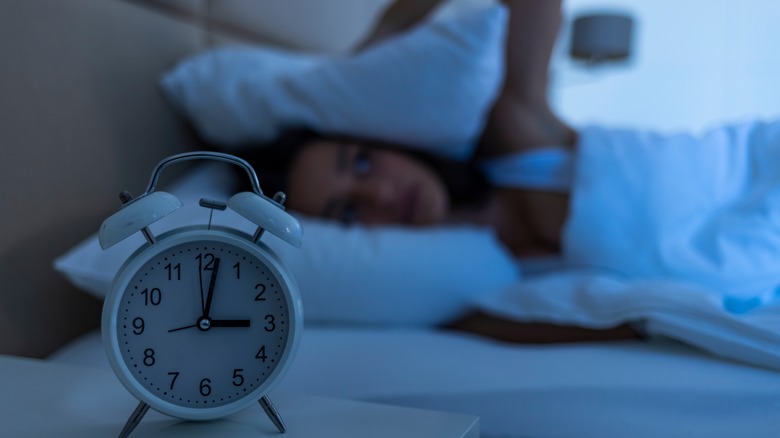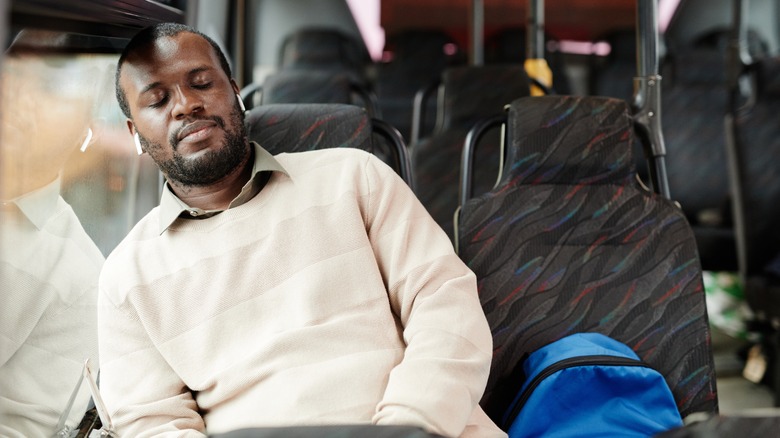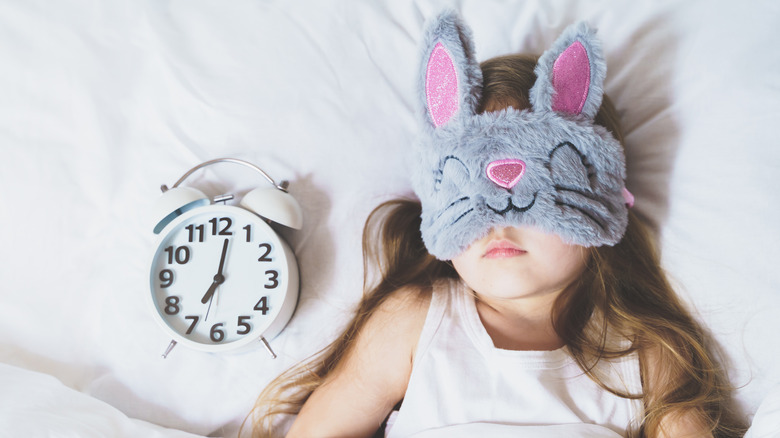What Makes You A Light Or Heavy Sleeper?
Beloved as it may be, sleep can be a fickle little thing. Some — given the opportunity and a decent place to sit –– could start snoring in the middle of a crowded room, while others may need to perform an intricate song and dance if they want even a shot at a good night's sleep. And unfortunately for many of us, reaching dreamland doesn't mean the battle for solid sleep is over.
While those we consider heavy sleepers might be able to blissfully ignore a freight train rolling by their bedroom window, light sleepers could jolt awake at the whisper of a sound or the faintest flicker of light. So, what's the deal?
The Sleep Foundation explains that being a light sleeper is different from being in a stage of light sleep. By design, our bodies will typically move through the four stages of the sleep cycle multiple times throughout the night. When you get 7 hours of uninterrupted sleep, with each cycle you spend more time in the more restorative stages of sleep. When light sleepers wake up throughout the night, it disrupts their sleep cycle and might mean less time in more restorative sleep stages, which can leave them feeling drained and frustrated in the morning.
Let's take a closer look at why some people are light sleepers while others are not, and how you can get the best sleep, regardless of what camp you're in.
What makes a light or heavy sleeper?
We all have an arousal threshold — a term used to describe the differences in the sensitivity we have to outside stimuli during sleep (per Sleep Foundation). Light sleepers have a lower arousal threshold, and heavy sleepers have a higher one. A number of factors can affect yours, like being in a lighter stage of sleep and the length of time you spent awake. People experiencing high levels of stress and anxiety also tend to wake more easily, as do people over the age of 60, suggesting age and stress levels play a role in the arousal threshold.
While research has yet to give us a clear-cut answer on what makes someone a light or heavy sleeper, the Sleep Foundation states that genetics, underlying sleep disorders, and elements of the bedroom environment can all be contributing factors.
A 2010 study published in Current Biology also suggested that sleep spindles might play a role in how we react to outside stimuli during sleep. The study explains that sleep spindles are spontaneous brain rhythms that are believed to be capable of altering the effects of external stimuli. While the frequency with which we produce sleep spindles varies from person to person, on an individual basis it tends to be consistent from one night to the next. The data showed that those who generated more sleep spindles had a higher resilience to noisy or disruptive stimuli during sleep.
How to get more deep sleep, no matter what kind of sleeper you are
If you find yourself suffering from poor sleep, you might take a look at your sleep hygiene and see if there's any room for adjustment.
Everyday Health suggests implementing a consistent bed and wake time for better sleep quality. The routine will allow your circadian rhythm to get into a groove. You might also try keeping your phone out of the room and the TV off, especially if you're a light sleeper, to reduce the potential for noise disturbances. While you're tightening the reins on your screen time, try going sans screens for at least half of an hour before bedtime. The light from our TV, phone, and computer screens discourages our bodies from releasing melatonin, making it harder for us to grow sleepy. The stimulation can also lead to cognitive arousal. Wearing an eye mask can also be a game changer, as it encourages melatonin production and keeps light sleepers undisturbed by stray light seeping into their rooms from outside.
For those prone to waking up because of outside noise, noise-canceling earbuds or a white noise machine can work wonders. In fact, a 2017 study published in Frontiers in Neurology found that the soft and fuzzy static of these machines can help people fall asleep faster. The Sleep Foundation also notes that avoiding alcohol and caffeine close to bedtime can do wonders to improve sleep quality.



